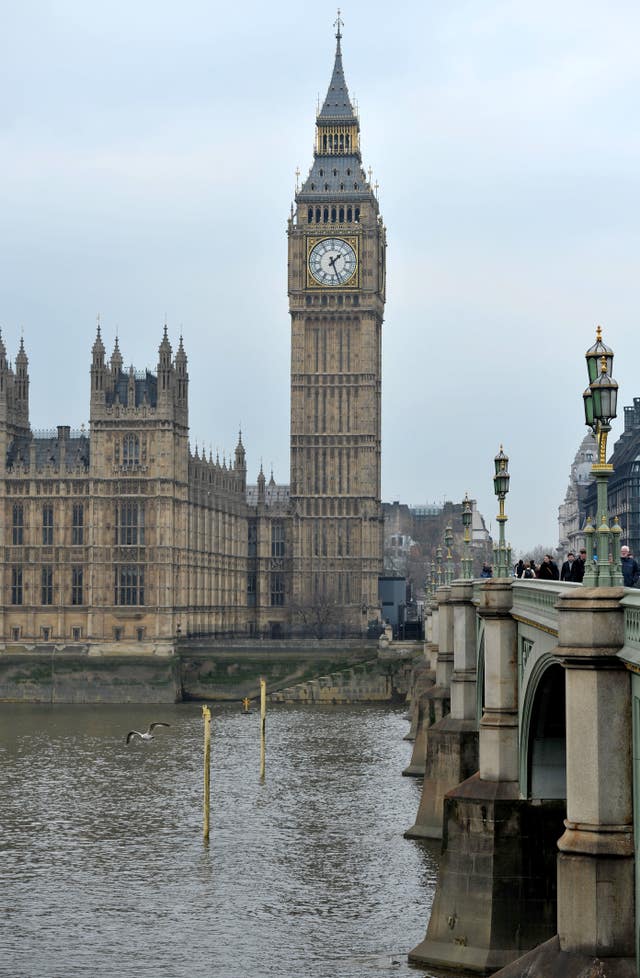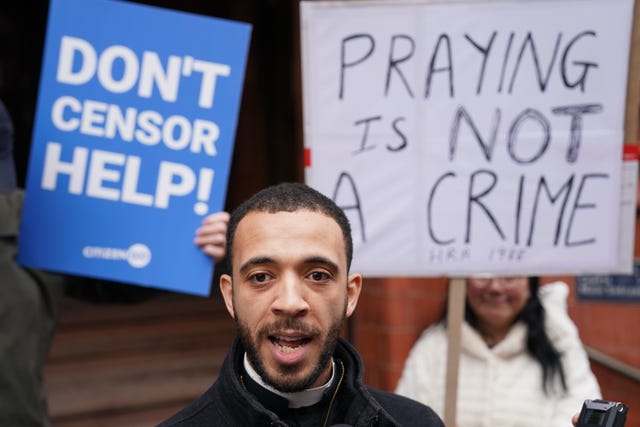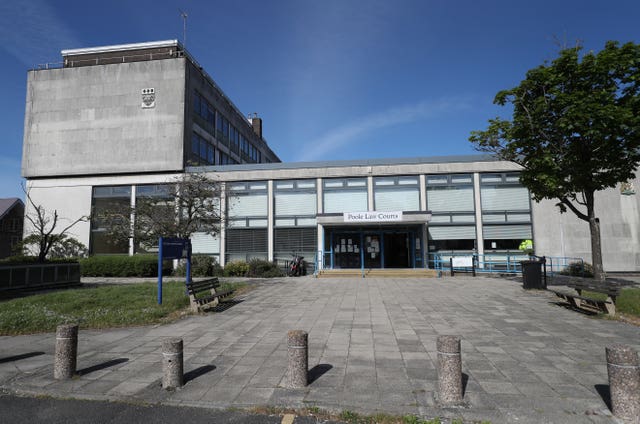What are safe access zones and is silent prayer banned?
The zones are now in place in England and Wales, with the equivalent having come into force in Scotland in September and Northern Ireland last year.

So-called buffer zones outside abortion clinics across England and Wales are now in place.
Silent prayer, which has been a point of contention, is not an automatic offence but people doing this within the zones could be liable for prosecution, according to new guidance.
Here, the PA news agency takes a look at what the new zones are and opposing views on the issue.
– What is a buffer zone?

Known as “safe access zones” in the legislation, these are areas within 150 metres of a clinic or hospital providing abortion services.
Under the Public Order Act 2023, it is an offence for someone to, within this area, do anything that intentionally or recklessly influences someone’s decision to use abortion services, obstructs them, or causes harassment, alarm or distress to someone using or working at the premises.
Anyone found guilty of such an offence will face an unlimited fine.
– Where does this apply?
England and Wales.
Legislation creating buffer zones around abortion clinics in Scotland, banning any protests or vigils there, came into force last month.
In Northern Ireland, safe access zones at health service locations which offer abortion and birth control services have been in place since September 2023.
– Weren’t buffer zones already in place in England and Wales?

A similar measure has been in effect outside some clinics but these have been enacted by councils, rather than being national legislation.
Known as public spaces protection orders (PSPOs), the first in the UK was enacted by Ealing Council in west London in April 2018, outside the MSI Reproductive Choices Clinic in Mattock Lane.
Campaigners had long made the case for the need for national legislation, arguing that PSPOs depend on local councils’ willingness, are timebound, can be expensive and result in a postcode lottery.
– As it is the Public Order Act 2023, why have the zones only come into effect from October 31 2024?
The Bill – which on the whole is aimed at curbing guerrilla protest tactics used by groups such as Just Stop Oil and Extinction Rebellion – received royal assent on May 2 2023, becoming law.
But in December the then-Conservative government launched a consultation into non-statutory guidance around the enforcement of the safe access zones.
That guidance suggested prayer within such a zone “should not automatically be seen as unlawful”, and that silent prayer “is protected as an absolute right under the Human Rights Act 1998”.
– So silent prayer has been a sticking point?

Yes. Pro-choice campaigners argued that the draft guidance did not reflect the debate in Parliament.
MPs had in March 2023 rejected attempts to allow silent prayer in the zones.
A group of Tory and DUP MPs had tabled an amendment aimed at ensuring no offence is committed if a person is “engaged in consensual communication or in silent prayer” outside clinics or hospitals offering abortion services.
They argued that this section of the Bill was “leading us into the territory of thought crimes”, while one MP described it as “dystopian”.
But, in a free vote, the proposal was rejected by 116 votes to 299 – a majority of 183.
– What happened with the draft guidance under the Conservative government?
Final guidance was never published following the consultation.
Then-Home Office minister Laura Farris, at a committee hearing in March, rejected the idea the government was attempting to “water down” legislation by allowing silent prayer, saying: “I think it’s trying to judge where the line falls between competing rights and obligations. And I think that silent prayer is a difficult category on that.”

– What is the new guidance?
The Crown Prosecution Service (CPS) has published guidance to prosecutors stating there is no defence on religious or ethical grounds to people seeking to influence, obstruct or cause harassment to others within safe access zones.
The guidance refers to a 2022 Supreme Court ruling regarding safe access zones in Northern Ireland, where the court considered silent prayer to be among the acts which “were capable of falling within the scope of the statutory provision”.
The guidance states that “a person who carries out any of these activities within a safe access zone will not necessarily commit a criminal offence”.
It adds: “Prosecutors will need to consider not only all the facts and circumstances of the particular conduct but also the context in which the conduct takes place.”
In considering cases, it states that prosecutors should clearly identify “the overt act that gives rise to the offence” and evidence “from which the requisite intent or recklessness can be inferred”.
The College of Policing has published what it described as a “brief” for officers on Section 9 of the Act, which deals with safe access zones.
It states: “All decisions must be made on a case-by-case basis and must be balanced and proportionate to the circumstances.”
The Home Office said the guidance will “ensure there is clarity and consistency with the enforcement of the new offence”.
– Are the zones being marked out in some way?
There is no requirement within the legislation for the zones to be marked out.
The person suspected of an offence does not have to know or believe they are in a safe access zone, the CPS guidance states.
It is understood local police forces will work with clinics to decide whether signage marking out the zones would be helpful or not.
– What have anti-abortion campaigners been saying?

Campaigners have argued that not allowing silent prayer threatens their rights to freedom of expression and religious belief.
Right To Life UK said the zones will mean “vital practical support provided by volunteers outside abortion clinics, which helps to provide a genuine choice, and offers help to women who may be undergoing coercion, will be removed”.
The UK branch of ADF (Alliance Defending Freedom) said the right to engage in silent prayer is “the most basic of human rights” and described the enactment of the buffer zones as “a watershed moment for British freedoms”.
– And what about pro-choice groups?

Heidi Stewart, chief executive of the British Pregnancy Advisory Service (Bpas), welcomed the zones which, she said, “can’t come soon enough” after years of patients and staff at clinics facing “anti-abortion fanatics standing outside clinics for hours” staring, handing out leaflets and displaying “graphic and distressing posters”.
Louise McCudden, from MSI Reproductive Choices, said the new zones will protect women and frontline healthcare workers, adding: “Whatever your personal views are on abortion, nobody should be harassed while accessing healthcare.”
– Has anyone been prosecuted for breaching zones outside clinics where PSPOs are in place?

Yes. In October, ex-serviceman Adam Smith-Connor was convicted of breaching the safe zone around an abortion clinic in Bournemouth.
Poole Magistrates’ Court heard he had stood near a tree, with his head bowed and hands clasped as he silently prayed, partially in view of the clinic, and refused to leave the area when asked to do so by a community officer who spoke to him for an hour and 40 minutes.
He had denied failing to comply with the PSPO but was found guilty, with a judge saying what he did was “deliberate”.
Smith-Connor was given a two-year conditional discharge and ordered to pay more than £9,000 in court costs and victim surcharge after the legal proceedings brought by Bournemouth, Christchurch and Poole Council.
ADF UK said it is supporting Smith-Connor with an appeal against his conviction.
In February 2023, a Catholic priest accused the Government of “censoring the streets of the UK” and attempting to criminalise silent prayer after being cleared of charges claiming he intimidated service users near an abortion clinic.
Charges of failing to comply with a PSPO brought against Father Sean Gough and charity volunteer Isabel Vaughan-Spruce were withdrawn during a hearing at Birmingham Magistrates’ Court.
Fr Gough and Ms Vaughan-Spruce criticised the decision to charge them for “silently praying” and “praying for free speech”, saying they had been put “on trial for praying in an abortion facility censorship zone”.





